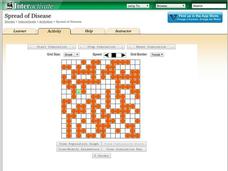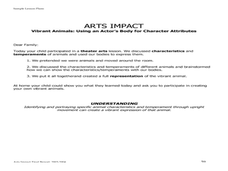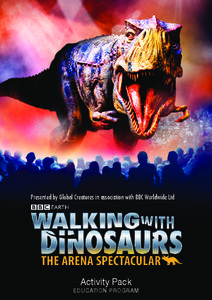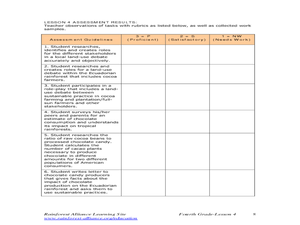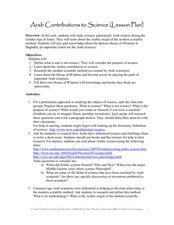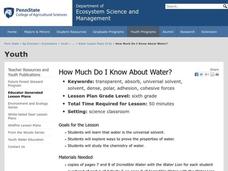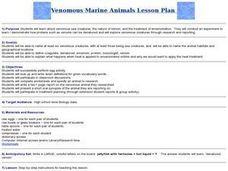Shodor Education Foundation
Rabbits and Wolves
A change in a parameter can end in overpopulation. The resources gives pupils the opportunity to control the parameters of rabbits and wolves in a natural setting. Using the set parameters, the simulation runs and displays the population...
Curated OER
I Wonder How the Manduca Life Cycle Compares To the Human Life Cycle...
Students study life cycles including developing their understanding of the human life cycle. They decide where they are in the human life cycle and provide reasons for that placement. They compare the human life cycle to that of the...
Shodor Education Foundation
Spread of Disease
Control the spread of a contagious disease. An applet allows pupils to run a simulation on the spread of a disease. Rules govern how the disease is spread and the length of time it takes to recover. Learners view the spread visually and...
Curated OER
Electricity--More Power to Ya!
Fourth graders use research tools to access and synthesize information. They gather and manipulate data using technology. Research and study the components of an electrical circuit. Create a brochure that demonstrates knowledge of how to...
PBS
Stories of Painkiller Addiction: Myth or Fact
Are opioids the most abused drug after marijuana? How hard is it for young people to obtain painkillers without a prescription? Middle and high schoolers explore the growing epidemic of opioid addiction with a lesson that prompts them to...
Curated OER
Vibrant Animals: Using an Actor's Body for Character Attributes
Students identify and portray specific character attributes through uprigth movement, creating a portrayal of an animal. They use vibrant, upright movement to convey the characteristics and temperament of specific animals. Finally,...
Curated OER
How Can We Keep Our Forests Intact and Have Our Chocolate Too?
Fourth graders explore various methods of growing and harvesting rainforest foods in order to sustain its biodiversity. They discuss the various uses for trees from several viewpoints. Students research chocolate demand and land use...
BBC
Walking with Dinosaurs
Breath new life into your class's study of dinosaurs with this extensive collection of materials. Offering everything from a printable T-rex mask, word searches, and connect-the-dots activities to informational handouts, hands-on...
Curated OER
ABC and 1-2-3 Farming
Students demonstrate how to alphabetize animal names. In this word study lesson, students identify animals that live on the farm and conduct a favorite farm animal survey. Students order animal pictures in alphabetical order.
Curated OER
How to Make a Rock
Second graders watch demonstrations and conduct experiments that show the three different types of rocks: igneous, sedimentary, and metamorphic.
Curated OER
Ecuadorian Rainforest
Have your class talk about the importance of the rainforest and the products that come from it. Learners watch a video showing the path of chocolate from the rainforest to the supermarket. They discuss how the rainforest and...
Curated OER
How Cell Phones Work
Fifth graders are introduced to the text, LITERACY LINE viewing the contents page. They review the definition of explanatory writing; discussing the features used and complete a KWL chart to identify what they already know about how a...
Curated OER
How the Environment Affects Our Health
Ninth graders explore how the environment affects health. In this infectious disease lesson, 9th graders investigate what environmental situations cause infections diseases. Students study the symptoms, treatments, prevention, and...
Curated OER
How can we keep our forests intact and have chocolate too?
Fourth graders recognize the need to sustain crops in the rainforest. In this rainforest lesson plan, 4th graders consider the use of products from the rainforest. Students discuss how people of different points of view decide...
Alabama Learning Exchange
Ready, Set,...Research!
Third graders complete a research project on a weather topic using a variety of resource materials. They demonstrate the use of dictionaries and encyclopedias. They write a report using the research material and grade level appropriate...
Curated OER
Making a Karst Dictionary
Students practice using the correct vocabulary in geology and hydrology. They use the Internet to research topics and practice their researching skills.
Curated OER
Arab Contributions to Science
Learners study Arab science and the origin of the modern scientific method. In this science lesson plan students fill in their own House of Wisdom books.
Curated OER
Substance Use, or Abuse?
Students identify the medicinal benefits, and ill effects, of a variety of controlled substances. They determine whether or not they think hallucinogens should be researched for possible medicinal purposes.
Curated OER
How Much Do I Know About Water?
Sixth graders explore how water behaves on a penny. In this states of matter lesson, 6th graders observe water as they add drops to a penny. This lesson helps students apply the adhesive properties of water to the water cycle.
Curated OER
How Much Do I Know About Water?
Sixth graders explore ways to analyze the properties of water and examine the chemistry of water. In this water lesson students work in groups and complete several activities.
Curated OER
Venomous Marine Animals
Students name and describe six venomous marine animals. After participating in an activity, they define new vocabulary words. In groups, they complete worksheets to use while researching a specific venomous animal of their choice. ...
Curated OER
The History of Mathematics
Research the interrelationship between math and science. Search the Internet to discover the history of several branches of mathematics and make text-to-world connections between the concepts covered in each branch with related...
Curated OER
How Much Radiation is Around You?
Students examine the use, misuse and fear of radiation. They read an article about radiation on food and discuss the positives and negatives of this process. They answer questions to complete the lesson.
Curated OER
Survivor M.D.: Tattooed Doctor
Learners view a video clip showing different medical careers. They complete a worksheet to discover careers they might have not heard about. They discuss the amount of education and training needed.


